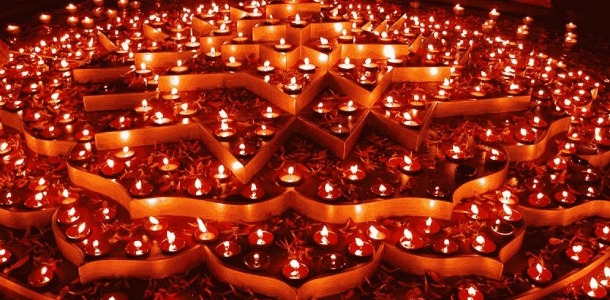
Diwali or Deepavali is the Hindu festival of lights celebrated every year in autumn in the northern hemisphere (spring in southern hemisphere).[4][5] It is an official holiday in Fiji, Guyana, India,[6] Pakistan,[7] Malaysia, Mauritius, Myanmar, Nepal, Singapore, Sri Lanka, Suriname, and Trinidad and Tobago. One of the major festivals of Hinduism, it spiritually signifies the victory of light over darkness, good over evil, knowledge over ignorance, and hope over despair.[8][9][10] Its celebration includes millions of lights shining on housetops, outside doors and windows, around temples and other buildings in the communities and countries where it is observed.[11] The festival preparations and rituals typically extend over a five-day period, but the main festival night of Diwali coincides with the darkest, new moon night of the Hindu Lunisolar month Kartika in Bikram Sambat calendar. In the Gregorian calendar, Diwali night falls between mid-October and mid-November.
Before Diwali night, people clean, renovate, and decorate their homes and offices.[12] On Diwali night, people dress up in new clothes or their best outfit, light up diyas (lamps and candles) inside and outside their home, participate in family puja (prayers) typically to Lakshmi – the goddess of fertility and prosperity. After puja, fireworks follow,[13] then a family feast including mithai (sweets), and an exchange of gifts between family members and close friends. Deepavali also marks a major shopping period in nations where it is celebrated.[14]
The name of festive days as well as the rituals of Diwali vary significantly among Hindus, based on the region of India. In many parts of India,[15] the festivities start with Dhanteras (in Northern and Western part of India), followed by Naraka Chaturdasi on second day, Deepavali on the third day, Diwali Padva dedicated to wife–husband relationship on the fourth day, and festivities end with Bhai Dooj dedicated to sister–brother bond on the fifth day. Dhanteras usually falls eighteen days after Dussehra.
On the same night that Hindus celebrate Diwali, Jains celebrate a festival also called Diwali to mark the attainment of moksha by Mahavira,[16][17] Sikhs celebrate Bandi Chhor Divas to mark the release of Guru Hargobind from a Mughal Empire prison,[18] and Newar Buddhists, unlike the majority of Buddhists, celebrate Diwali by worshipping Lakshmi.[19][20]
Hindus across the world celebrate Diwali in honor of the return of Lord Rama, his wife Sita and his brother Lakshmana from exile of 14 years after Rama defeated Ravana. To honor the return of Lord Rama, Sita and Lakshmana from Lanka and to illuminate their path, villagers light Diyas to celebrate the triumph of good over evil.[42] For some, Diwali also celebrates the return of Pandavas after 12 years of Vanvas and one year of "Agyatavas" in Mahabharata. Furthermore, Deepavali is linked to the celebration of Lakshmi, who is venerated amongst Hindus as the goddess of wealth and prosperity and is the wife of Lord Vishnu. The 5-day festival of Diwali begins on the day Goddess Lakshmi was born from the churning of cosmic ocean of milk by the Devas (gods) and the Asuras (demons); while the night of Diwali is the day Lakshmi chose Vishnu as her husband and they were married.[21][43] Along with Lakshmi, devotees make offerings to Ganesha, who symbolizes ethical beginnings and fearless remover of obstacles; Saraswati, who embodies music, literature and learning and Kubera, who symbolizes book-keeping, treasury and wealth management.[21] Other Hindus believe that Diwali is the day Vishnu came back to Lakshmi and their abode in the Vaikuntha; so those who worship Lakshmi receive the benefit of her good mood, and therefore are blessed with mental, physical and material wellbeing during the year ahead.[44]
Hindus in India's eastern region, such as Odisha and West Bengal, worship the goddess Kali instead of Lakshmi, and call the festival Kali Puja.[45][46] In India's Braj and north central regions, the god Krishna is recognized. People mark Mount Govardhan, and celebrate legends about Krishna. In other regions, the feast of Govardhan Puja (or Annakoot) is celebrated, with 56 or 108 different cuisines prepared, offered to Krishna, then shared and celebrated by the local community.
In West and certain Northern parts of India, the festival of Diwali marks the start of a new Hindu year.
I'm using AVG protection for a couple of years, and I recommend this product to all you.
ReplyDelete